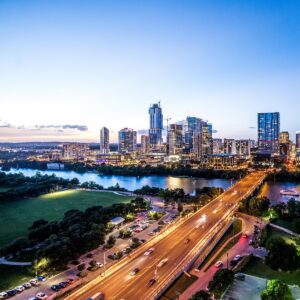Is Austin Texas a Good Place to Live? 8 Pros and Cons of Living in Austin TX
We took a systematic approach to answer – is Austin Texas a good place to live?
This question is quite polarizing as everyone seems to have an opinion about this fast-growing city. In some respects, the vibrant music culture, tech-driven economy, and lifestyle amenities can seem like an attractive option.
Yet, as with any city, there are upsides and downsides to consider. Let’s break this down thoroughly, so you’ll get a clearer idea of whether Austin Texas is a good place to live or not.
Table of Contents
Methodology
To truly determine if Austin a good place to live, we thoroughly analyzed publicly available data, reviewed housing statistics, and evaluated firsthand accounts from locals and transplants.
In that case, we aimed to provide an unbiased assessment of the pros and cons of living in Austin Texas.
By focusing on essential aspects like cost of living, traffic, lifestyle perks, and environmental factors, we’ve created a resource you can trust. Of course, every individual’s experience might differ slightly, but this article serves as a solid foundation for your decision-making process.
Pros and Cons of Austin TX – 4 Pros
1. Thriving Job Market
In many ways, Austin’s job market is its crowning jewel. As a matter of fact, tech companies like Tesla, Apple, and Dell have planted their headquarters or major campuses here.
This influx of tech giants has created thousands of job opportunities, making Austin Texas a good place to live for those in the tech industry. Moreover, sectors like healthcare, education, and government often see steady demand, ensuring a well-rounded job market overall.
The city’s unemployment rate tends to hover below the national average. For instance the unemployment rate is now around 3%, significantly lower than the U.S. average of 3.7%. So, this thriving economic climate could be attractive to job seekers.
That said, competition can still be fierce for high-paying roles. Nevertheless, with its status as a tech hub, Austin often offers lucrative salaries compared to many other cities of similar size.
Either way, is Austin a good place to live for those seeking a job advancement? Absolutely.
2. Cultural and Entertainment Scene
If you enjoy lively music festivals, diverse dining options, and vibrant nightlife, Austin might just be the place for you. Known as the “Live Music Capital of the World,” Austin hosts countless concerts and festivals, such as South by Southwest (SXSW) and Austin City Limits (ACL). Basically, it’s a cultural hotspot for entertainment seekers of all kinds.
Foodies, too, have a lot to love about Austin. The city offers everything from world-class barbecue to farm-to-table cuisine. Meanwhile, art galleries, local markets, and independent theaters round out its cultural offerings.
Clearly, for anyone who thrives in an energetic and creative environment, Austin tends to deliver. That being said, keeping up with its fast-paced cultural life can occasionally feel overwhelming.
3. Outdoor Activities and Green Spaces
For outdoor enthusiasts, Austin’s natural beauty is an undeniable perk. The city’s greenbelts, parks, and lakes provide ample opportunities for hiking, biking, kayaking, and more.
For instance, the Barton Creek Greenbelt offers nearly 13 miles of scenic trails for both casual walkers and hardcore hikers. Similarly, Lady Bird Lake—located in the heart of downtown—is a favorite spot for paddleboarding and canoeing.
Meanwhile, sunny weather often allows residents to enjoy outdoor activities year-round. However, summers can be brutally hot, with temperatures frequently exceeding 100°F. Still, for individuals who appreciate nature’s beauty and recreational spaces, this city provides plenty of options to explore.
4. Progressive Community and Inclusivity
As a matter of fact, Austin has a reputation for being one of the most progressive cities in Texas. Known for its inclusive and diverse community, it’s often viewed as a welcoming environment for people from all walks of life. Young professionals, artists, and LGBTQ+ individuals tend to feel at home here, thanks to the city’s open-minded culture.
Additionally, Austin’s progressive policies often align with environmental sustainability and community building. For instance, various local initiatives focus on renewable energy, green construction, and waste reduction.
That being said, the city’s progressive nature might not appeal to everyone, especially those who prefer a more traditional or conservative setting.
Pros and Cons of Living in Austin Texas – 4 Cons
1. High Cost of Living
One of the major negatives of living in Austin TX is the increasingly high cost of living. Housing prices, in particular, have skyrocketed over the past decade. For example, the median home price in Austin is roughly $500,000, compared to the national median of around $380,000.
So, is Austin a good place to live if you want to buy a home and don’t have a decent salary? Well, it looks like it would be pretty tough.
Likewise, rent for a one-bedroom apartment can often exceed $1,800 per month, making affordability a challenge for many residents.
Additionally, everyday expenses like groceries, transportation, and dining out tend to be pricier than the national average.
While higher salaries in industries like tech can offset these costs for some, others might find it difficult to make ends meet. In short, affordability can be a real obstacle for many newcomers and long-time residents alike.
2. Traffic and Transportation Woes
Another frequent complaint about what is living in Austin Texas like revolves around its traffic problems. In fact, Austin consistently ranks among the most congested cities in the U.S.
For instance, residents often report spending upwards of 50 hours per year stuck in traffic, which is slightly higher than the national average.
Public transportation options remain somewhat limited, further exacerbating commuting challenges. While the city has made efforts to expand its transit system through projects like Project Connect, progress has been slow.
For those who prioritize efficient transportation systems, Austin might feel like a logistical headache at times. Nevertheless, biking and walking are viable alternatives for residents who live near downtown or other central hubs.
3. Extreme Weather Conditions
As great as Austin’s sunny climate can be, the city’s weather is often a double-edged sword. Summers, for example, can be unbearably hot and humid, with temperatures frequently reaching triple digits. These extreme conditions can make outdoor activities less enjoyable during certain months.
Additionally, Austin’s occasional severe weather events—such as flash flooding—pose safety risks and property damage concerns.
In 2021, Winter Storm Uri highlighted the city’s vulnerability to extreme cold snaps, leaving many residents without power or running water for days. So, while mild winters are a perk, Austin’s unpredictable weather can sometimes be a significant drawback.
4. Rapid Growth and Overcrowding
Lastly, Austin’s rapid growth has led to overcrowding in many neighborhoods and public spaces.
Between 2010 and 2020, the city’s population grew by nearly 34%, making it one of the fastest-growing cities in the country. This rapid expansion often strains local resources like schools, healthcare facilities, and infrastructure.
For instance, many residents report longer wait times for medical appointments or overcrowded classrooms in public schools.
Meanwhile, rising demand for housing contributes to urban sprawl, potentially diminishing the city’s charm. At the end of the day, Austin’s popularity can sometimes feel like a double-edged sword for its residents.
Frequently Asked Questions
Is Austin Texas a good place to live for families?
Yes, in many ways, Austin offers excellent amenities for families, including good schools, parks, and family-friendly events. However, the high cost of living might be a challenge for some.
What are the main negatives of living in Austin TX?
The primary downsides include traffic congestion, high housing costs, and extreme weather conditions. Additionally, rapid population growth has led to overcrowding in some areas.
How does Austin’s job market compare to other cities?
Austin has a robust job market, particularly in the tech sector, which often offers higher-than-average salaries. However, competition for top roles can be intense.
What is living in Austin Texas like for retirees?
Retirees might appreciate Austin’s cultural scene and warm climate. Nevertheless, the cost of living could be a drawback for those on fixed incomes.
Articles You Might Also Like





